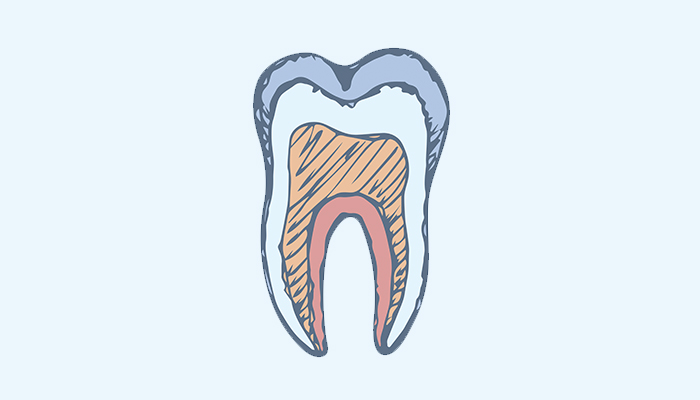We’ve all heard the term root canal–and usually not in a flattering context. Ah, the poor maligned root canal. Why all the fear? We are here to put your mind at ease. The root canal is not the boogey man people believe it to be. Quite the opposite! Now, get your nails out of the ceiling and keep reading to find out what the fuss is all about, what to look for when you need a root canal and what to expect during and after root canal treatment!
What is a Root Canal?
Let’s demystify the monster. A root canal, simply put, is a root filling. Easy, right? It is done to preserve a dead tooth. (We’re getting to that). Your tooth has a hard outer shell (enamel), a softer middle (dentin), and a space inside where your nerve, connective tissue, and blood supply (pulp) lives. This space is the root canal.
The pulp is secluded for a reason. It does not like visitors of any sort. It is a very delicate bit of tissue and it lives inside your hard tooth where it is well protected from outside threats. When the pulp comes into contact with the bacteria of the mouth, whether due to a cavity or an injury, it is very susceptible to bacterial infection which causes pain and may lead to the death of the tooth. Left untreated, a dead tooth can become seriously infected. Enter the root canal! Look! He’s wearing a cape!
The root canal treatment removes the dead or dying tissue from inside the tooth. The root canal space is then shaped for ideal cleaning then filled. Now your tooth has been preserved and can function, pain free, for a long time. Doesn’t seem so terrible, after all, does it?

Why Do I Need a Root Canal?
Root canal treatment is used in a number of situations where the pulp has been compromised. Most of these situations are painful and the root canal alleviates the pain as well as preserving the tooth.
- Fracture of tooth into the nerve
- Infection
- Infected teeth are dead. Dead teeth must have root canal treatment or be extracted
- Decay into the nerve
- Elective
- Some cosmetic procedures will require teeth to be cut close to or into nerve
- Cracked tooth into nerve
- Previous Restoration such as large filling or Crown
- Sometimes teeth don’t survive filling or crown procedures especially if the decay was very large
What Options Do I Have to Root Canal Treatment?
A root canal is not the only way to treat a dead or dying tooth. Extraction of the tooth with an implant replacement is another option. Sometimes a root canal isn’t the best option for you. For instance, if there is very little healthy tooth structure left, extraction might be your best bet. Your dentist will advise you of the many factors that will determine the best treatment for you such as:
- How much of the healthy tooth structure is left
- Health of the adjacent teeth
- Predictability of the root canal
- Anatomy of the roots – Can they be cleaned all the way to the tip?
- Bone level
- Tooth structure
- Condition of the bone around the tooth
- Size of the infection
- Large infections in the surrounding bone are more difficult to treat
Do I Have to Have a Crown?
Once you have removed the blood supply from the tooth, it can become brittle and prone to fracture. It’s kind of like that old oak tree that drops limbs on the roof in a rainstorm. To protect back teeth from fracture, they should be crowned as soon as possible following the root canal. Front teeth, because they don’t do take the heavy forces of chewing, don’t usually require a crown after root canal treatment.
Do Root Canals Hurt?
Many times, a root canal is done when the tooth is already in pain due to an infection and the root canal treatment brings much-needed relief. With modern techniques and wonderful anesthesia, root canals are largely painless. There are now instruments that are able to do the hard work of cleaning the canals without causing trauma to the teeth. Most people are comfortable during their procedure and report little discomfort afterward. However, It is not unusual to have some sensitivity or soreness for a few days following your procedure. Each procedure is different! Ask your dentist what to expect after your treatment.
How Long Does a Root Canal Last?
Root canal treatment can last decades or even a lifetime when placed in a well-chosen tooth. Remember, though, that no two teeth are the same. Front teeth don’t take as much biting pressure as back teeth. Back teeth with straight roots with large root canal spaces are much easier to clean and fill than those with curved roots and narrow root canal spaces. Many factors can come into play. If a tooth is treated before the infection spreads to the surrounding bone, it will likely do better than a tooth with a large infection around the root. Factors that are likely to shorten the life of a root canal are things like
- Curved roots
- Narrow Canals
- Abnormal tooth anatomy
- Some teeth have extra canals
- Imperfections in filling
- Waiting to place a crown

How Do I Know if I Need a Root Canal?
Pain
When your tooth becomes inflamed, it causes pain. Not all pain is equal, though. So how do you know what your pain means for your tooth? The inflammation of the pulp of your tooth is called a pulpitis. Adorable, right? There are two types of pulpitis–reversible and irreversible. A reversible pulpitis can heal and is usually a sharp pain that goes away quickly. An irreversible pulpitis causes a lingering pain that can be severe and will require root canal treatment.
When you have an irreversible pulpitis, the pain can appear for no reason and it tends to hang around. It may wake you up at night or start aching when you are just sitting there minding your own business. Irreversible pulpitis can be mild or severe. Another cause of pain that requires a root canal is infection. Teeth that will require root canal will usually have one or more of these symptoms:
- Severe cold sensitivity that lingers
- Tooth that is tender to touch
- Tooth that is painful during chewing
- Pain that wakes you up at night
- Spontaneous pain
Swelling
Swelling is a sign of infection. If the tooth dies, the infection can spread from the inside of the tooth to the surrounding bone forming an abscess. Dental infections can be dangerous. See your dentist at the first signs of swelling.
Tooth Discoloration
Teeth can darken when they die. Front teeth are especially prone to injury in childhood. Sometimes a tooth will be traumatized and take years to die. If you notice a discoloration or darkening of a tooth, have it evaluated.
Pimple on Gum
Sometimes, something that looks like a pimple will appear on the gums around a tooth. This is a fistula and it is a sign of infection. When a tooth becomes infected, the pus needs somewhere to go. The fistula is a way to drain the infection from the tooth into the mouth. Disgusting, right? Most of the time, they are painless and the good news is, they go away when your tooth has root canal treatment.
How is a Root Canal Performed?
A root canal is essentially just a filling of the root. A small opening is made in the top of your tooth, just as if you were having a filling done. The hole will extend to the root canal space of your tooth and all the tissues will be removed. Your dentist will use special instruments to measure the canals and to shape them for optimal cleaning. They will take several x-rays to verify their location within the tooth. Once the canals are clean and disinfected, your dentist will fill them and seal up your tooth. It’s that simple. Sometimes a root canal will be performed in one visit, and sometimes it will take two, depending on whether the canals are infected and how inflamed the pulp is.
What Are Complications of a Root Canal?
Root canals have a high success rate over a long period of time, but due to the complex nature and anatomy of the inside of a tooth, complications can arise.
- Incomplete healing
- Instrument separation
- Perforation or hole in tooth during cleaning of canals
- Most of these can be repaired, some will require extraction
- Infection
- Hidden canals
- Fracture of root
- Fracture of tooth
- Post-operative pain
Talk to your dentist about possible complications when you are deciding to have a root canal. Some complications are not possible to foresee, luckily, you can always abort and remove the tooth, knowing that you tried all you could to preserve it.
Are Root Canals Safe?
When performed correctly, Root canals have been proven to be a safe and effective. There is a lot of misinformation on the internet, especially relating to a study done by a Dr. Price over a hundred years ago. Even though that study was debunked over fifty years ago, its ghost still haunts the internet. Today, we have better technology than ever including rotary instruments, digital imaging, and magnification that make root canals more predictable than ever.
What Should I Expect at My Root Canal Appointment?
Your root canal treatment may be done in one or multiple appointments, depending on your tooth. Expect the appointment for your root canal treatment to be longer than for a filling appointment. You will be very numb and usually a rubber dam or some other device will be used to isolate your tooth from the rest of your mouth. This barrier keeps your airway safe from the small instruments your dentist will use and the inside of your tooth safe from the bacteria found inside your mouth.
Your dentist will take several x-rays during your treatment to make sure each canal is found and measured. Now would be a great time to listen to that podcast you’ve been hearing about or to catch up on your audiobook! Your mouth will be open for a long time and you won’t get a lot of breaks because the rubber dam must stay on for the entire procedure. You should be comfortable throughout your appointment, although, expect your jaws to be tired afterward. The time it takes for a root canal varies from tooth to tooth. 90 minutes is not an unusual appointment time for a root canal treatment.
How Long Will it Take to Recover After a Root Canal?
Depending on the reason for your root canal, it can take up to six months for the bone around the tooth to heal. You can expect some soreness for a few days and your tooth may continue to feel different than your other teeth.
Here are some tips for caring for your tooth after treatment:
- If your dentist has recommended a crown, get one as soon as possible and do not eat hard foods on that side until the tooth has a crown.
- Brush and floss normally
- Let your dentist know if you experience any swelling
- Take medications as directed and report any changes
Call Your Dentist
So, now you know all about your friend, the root canal. You know what to look for and what kind of symptoms you will see if you need one. You also know what to expect during and after your root canal treatment. Your dental team is trained to answer your questions and to make you feel comfortable.

